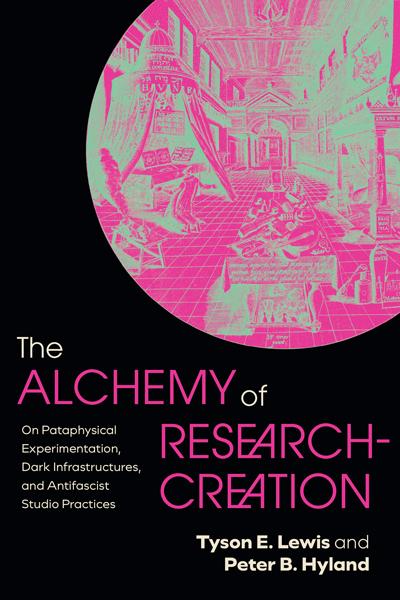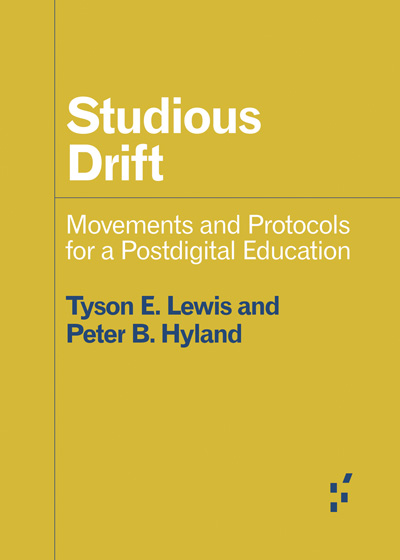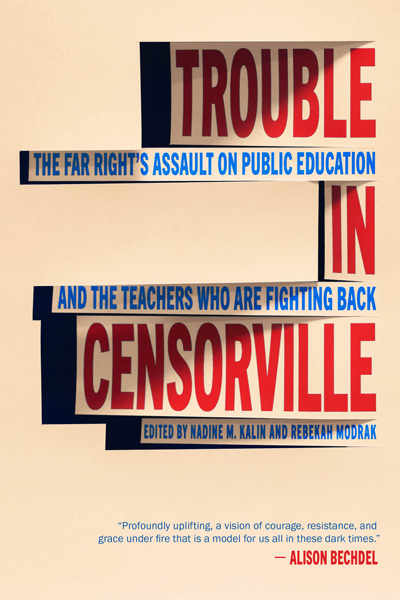Publications

Projects and programs operating through the Onstead Institute have yielded a range
of publications that advance the study, research, and understanding of ideas, issues,
practices, and techniques related to K–12 art and design education. To date, these
publications include the following.
Education as Experimentation Project
Books
 "The Alchemy of Research-Creation: On Pataphysical Experimentation, Dark Infrastructures,
and Antifascist Studio Practices"
"The Alchemy of Research-Creation: On Pataphysical Experimentation, Dark Infrastructures,
and Antifascist Studio Practices"
Authors: Tyson E. Lewis and Peter B. Hyland
Forthcoming from SUNY Press in April 2026
Research-creation is an attempt to suspend the operative divisions that define Western
modernity: divisions between the head and the hand, knowledge and pleasure, science
and art. Yet, this practice, which holds so much promise, has often fallen prey to
insipid hybridization between science and art, or facile interdisciplinarity — both
of which are fashionable trends in the current knowledge economy.
The "Alchemy of Research-Creation" charts a new, imaginative genealogy for research-creation,
one that returns to a spatial and temporal configuration that predates the advent
of the divided Western world: the alchemical studio. This shift to the alchemical
studio means a fundamental reconceptualization of the problematic of research-creation,
aligning it more with queer, pataphysical, and neurodiverse forms of non-knowledge
produced through occult practices than with more familiar and safe epistemological
questions concerning scientific validity and aesthetic judgment.
Through engagements with pataphysical artists, critical theorists, and occult practitioners,
Lewis and Hyland open up a dark dimension within research-creation that has the potential
to set adrift what can be thought and what can be sensed beyond the current coordinates
of our divided world.
"Studious Drift: Movements and Protocols for a Postdigital Education"
Authors: Tyson E. Lewis and Peter B. Hyland.
University of Minnesota Press, 2022
The global pandemic has underscored contemporary reliance on digital environments.
This is particularly true among schools and universities, which, in response, shifted
much of their instruction online. Because the rise of e-learning logics, ed-tech industries,
and enterprise learning-management systems all threaten to commodify further and instrumentalize
higher education, these technologies and platforms have to be creatively and critically
struggled over.
"Studious Drift" intervenes in this struggle by reviving the relationship between
studying and the generative space of the studio in service of advancing educational
experimentation for a world where digital tools have become a permanent part of education.
Drawing on Alfred Jarry’s pataphysics, the “science of imaginary solutions,” this
book reveals how the studio is a space-time machine capable of traveling beyond the
limits of conventional online learning to redefine education as interdisciplinary,
experimental, and public study.
Book Chapters
“Vestigial Research for Postdigital Pataphysics”
Authors: Tyson E. Lewis and Peter B. Hyland
Postdigital Research: Genealogies, Challenges, and Future Perspectives
Jandrić, P., MacKenzie, A., & Knox, J. (Eds.)
Springer, 2023
Articles
“The Anti-Fascist Politics of Studioing”
Authors: Tyson E. Lewis and Peter B. Hyland
Revista Portuguesa de Pedagogia (Vol. 56, 2022)
Read the open-access article on the Impactum Journals website.
“12 Experiments in E-Study for a Post-Pandemic World”
Authors: Tyson E. Lewis and Peter B. Hyland
Philosophy and Theory in Higher Education (Volume 3, Issue 3, Publication Year 2021,
pp. 147–158)
Read the open-access article on the Peter Lang website.
“Organizing a Studious Conference for Public Experimentation”
Authors: Tyson E. Lewis, Dani Friedrich and Peter B. Hyland
Visual Arts Research (Vol. 44, Issue 1, 2018)
Read the open-access article on the Scholarly Publishing Collective website.
Other Institute-Sponsored Faculty Collaborations
Books
"Trouble in Censorville: The Far Right’s Assault on Public Education and the Teachers Who Are Fighting Back
 Authors: Nadine M. Kalin and Rebekah Modrak
Authors: Nadine M. Kalin and Rebekah ModrakDisobedience Press, 2024
From Florida, whose “Don’t Say Gay” law prohibits K–12 instruction on gender identity
and sexual orientation, to Texas, which is shuttering libraries in schools, America
is in the middle of a far-right war on public education. Now, for the first time,
K–12 educators from across the nation give readers a teacher's-eye view of the radical
right crusade to take down public education, coordinated by well-funded, well-connected
far-right political interests. Christian nationalists hell-bent on erasing the line
between church and state, white supremacists opposed to a curriculum that teaches
the enduring effects of anti-Black racism, political action committees, such as Moms
for Liberty, calling for the banning of novels featuring LGBTQ+ people, and profiteers
eager to divert taxpayer dollars into private schools are mounting a relentless attack
on teachers, the students they serve, and the commitment to public education that
is a cornerstone of democracy. “It’s a phenomenal, unprecedented moment that we’re
in,” says a librarian, recently retired from her Texas school. “It’s surprising how
many people don’t know what’s going on. I talk to reporters who have no idea. And
they’re reporters.”
In "Trouble in Censorville," public school teachers from states as far-flung as Florida,
Texas, Kentucky, New Jersey, Tennessee, Wisconsin, and Washington describe, in their
own words, being threatened, stalked, doxxed, ostracized, smeared as “pedophiles”
and “Marxists,” placed on leave, and fired for teaching historical truth and racial
justice, supporting LGBTQ+ students and, in one case, for wearing “insufficiently”
feminine attire. Their stories bring readers face-to-face with the human cost of these
attacks, which range from social isolation to pent-up anger over institutional betrayal
to the terrible toll on teachers’ mental and physical health.
And yet, teachers are fighting back. They’re mobilizing colleagues, parents, and community
members who share their faith in the freedom to read, the freedom to think critically,
and the freedom to challenge small-minded provincialism. Their stories of frontline
resistance, collected here, provide a battle plan for confronting censorship, rallying
support, and mobilizing a grassroots defense of public schools. Their gripping testimonials
are enhanced by a timeline that situates today’s far-right war on public education
in the context of American history, moving briskly from Reconstruction to the anti-left
and anti-gay fearmongering of the McCarthy era to the Black Lives Matter movement
to the Trump presidency. Terrifying, infuriating, and inspiring, Trouble in Censorville
sounds the alarm for a democracy on fire.